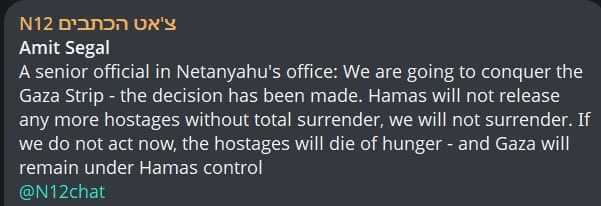Israeli Officials Declare Plan to Conquer Gaza, Citing Hostage Crisis Urgency
In a significant escalation of military strategy, a senior official in Prime Minister Benjamin Netanyahu"s office has announced plans for the conquest of the Gaza Strip. This decision, driven by the ongoing hostage crisis and the need to dismantle Hamas"s control, has profound implications for the region and its stability. According to the official, “Hamas will not release any more hostages without total surrender, we will not surrender.” The urgency of the situation is underscored by concerns that hostages may perish from hunger if decisive action is not taken soon.
Background & Context
The Gaza Strip, a densely populated area governed by Hamas since 2007, has been a focal point of Israeli-Palestinian tensions for decades. The recent flare-up in violence, marked by Hamas"s attacks and subsequent Israeli retaliatory strikes, has exacerbated an already dire humanitarian situation. The hostage crisis, which has seen numerous Israeli citizens taken captive, has intensified calls within Israel for a robust military response. The Israeli government views the current moment as a critical juncture, asserting that failure to act could result in a prolonged period of Hamas governance and further endanger the lives of the hostages.
This latest announcement aligns with previous reports regarding potential military strategies aimed at Gaza, reflecting a shift in Israel’s approach to dealing with Hamas. As tensions mount, public opinion within Israel appears increasingly supportive of military action, viewing it as a necessary measure for national security and the safety of its citizens.
Key Developments
The declaration from Netanyahu"s office signals a clear commitment to a military solution, with the official emphasizing that any negotiations for the release of hostages would only be considered after Hamas"s total surrender. This stance has significant implications for future diplomatic efforts and the potential for escalating violence in the region. The official stated, “If we do not act now, the hostages will die of hunger - and Gaza will remain under Hamas control,” highlighting the urgency felt by Israeli leadership.
In parallel, the Israeli military has been ramping up operations in the region, with reports of increased troop deployments and airstrikes targeting Hamas infrastructure. This strategic shift indicates a broader military campaign aimed at not only securing the release of hostages but also dismantling Hamas"s operational capabilities. The situation remains fluid, with the potential for rapid developments as the Israeli government seeks to implement its military objectives.
Broader Impact
The implications of this announcement extend beyond the immediate military objectives. Analysts warn that a full-scale invasion of Gaza could lead to widespread civilian casualties and further destabilization of the region. International reactions are likely to be mixed, with some nations supporting Israel"s right to defend itself, while others may condemn the military escalation as disproportionate. Historical comparisons can be drawn to previous conflicts in Gaza, where military operations have often resulted in significant humanitarian crises and drawn international scrutiny.
Experts suggest that the Israeli government"s hardline stance may also affect its relationships with neighboring countries and influence the broader peace process. The potential for increased violence could reignite tensions not only between Israelis and Palestinians but also among regional powers, complicating an already intricate geopolitical landscape.
What"s Next
As the situation continues to evolve, the Israeli government faces pressing questions about the next steps in its military campaign. The decision-making process within Netanyahu"s cabinet will be scrutinized, particularly as the military strategy unfolds. Recent developments indicate that discussions surrounding a potential annexation of Gaza may be on the horizon, reflecting a long-term vision for the region that diverges from previous peace initiatives.
In the coming days, the Israeli Cabinet is expected to convene to solidify its stance on the Gaza situation, which may include discussions on military tactics and humanitarian considerations. Meanwhile, the international community watches closely, with calls for restraint and a focus on the humanitarian implications of any military action. As previously reported, the situation remains highly volatile, with the potential for significant ramifications both domestically and internationally.
For ongoing updates on this developing story, follow our coverage of the region"s dynamics and related geopolitical events.



![[Video] Gunfire between Iraqi security forces and Sadr militias in Baghdad](/_next/image?url=%2Fapi%2Fimage%2Fthumbnails%2Fthumbnail-1768343508874-4redb-thumbnail.jpg&w=3840&q=75)
